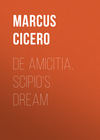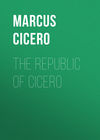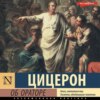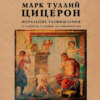Loe raamatut: «Cicero's Tusculan Disputations», lehekülg 5
BOOK II.
ON BEARING PAIN
I. Neoptolemus, in Ennius, indeed, says that the study of philosophy was expedient for him; but that it required limiting to a few subjects, for that to give himself up entirely to it was what he did not approve of. And for my part, Brutus, I am perfectly persuaded that it is expedient for me to philosophize; for what can I do better, especially as I have no regular occupation? But I am not for limiting my philosophy to a few subjects, as he does; for philosophy is a matter in which it is difficult to acquire a little knowledge without acquainting yourself with many, or all its branches, nor can you well take a few subjects without selecting them out of a great number; nor can any one, who has acquired the knowledge of a few points, avoid endeavoring with the same eagerness to understand more. But still, in a busy life, and in one mainly occupied with military matters, such as that of Neoptolemus was at that time, even that limited degree of acquaintance with philosophy may be of great use, and may yield fruit, not perhaps so plentiful as a thorough knowledge of the whole of philosophy, but yet such as in some degree may at times deliver us from the dominion of our desires, our sorrows, and our fears; just as the effect of that discussion which we lately maintained in my Tusculan villa seemed to be that a great contempt of death was engendered, which contempt is of no small efficacy towards delivering the mind from fear; for whoever dreads what cannot be avoided can by no means live with a quiet and tranquil mind. But he who is under no 65fear of death, not only because it is a thing absolutely inevitable but also because he is persuaded that death itself hath nothing terrible in it, provides himself with a very great resource towards a happy life. However, I am not tolerant that many will argue strenuously against us; and, indeed, that is a thing which can never be avoided, except by abstaining from writing at all. For if my Orations, which were addressed to the judgment and approbation of the people (for that is a popular art, and the object of oratory is popular applause), have been criticised by some people who are inclined to withhold their praise from everything but what they are persuaded they can attain to themselves, and who limit their ideas of good speaking by the hopes which they conceive of what they themselves may attain to, and who declare, when they are overwhelmed with a flow of words and sentences, that they prefer the utmost poverty of thought and expression to that plenty and copiousness (from which arose the Attic kind of oratory, which they who professed it were strangers to, though they have now been some time silenced, and laughed out of the very courts of justice), what may I not expect, when at present I cannot have the least countenance from the people by whom I used to be upheld before? For philosophy is satisfied with a few judges, and of her own accord industriously avoids the multitude, who are jealous of it, and utterly displeased with it; so that, should any one undertake to cry down the whole of it, he would have the people on his side; while, if he should attack that school which I particularly profess, he would have great assistance from those of the other philosophers.
II. But I have answered the detractors of philosophy in general, in my Hortensius. And what I had to say in favor of the Academics, is, I think, explained with sufficient accuracy in my four books of the Academic Question.
But yet I am so far from desiring that no one should write against me, that it is what I most earnestly wish; for philosophy would never have been in such esteem in Greece itself, if it had not been for the strength which it acquired from the contentions and disputations of the 66most learned men; and therefore I recommend all men who have abilities to follow my advice to snatch this art also from declining Greece, and to transport it to this city; as our ancestors by their study and industry have imported all their other arts which were worth having. Thus the praise of oratory, raised from a low degree, is arrived at such perfection that it must now decline, and, as is the nature of all things, verge to its dissolution in a very short time. Let philosophy, then, derive its birth in Latin language from this time, and let us lend it our assistance, and bear patiently to be contradicted and refuted; and although those men may dislike such treatment who are bound and devoted to certain predetermined opinions, and are under such obligations to maintain them that they are forced, for the sake of consistency, to adhere to them even though they do not themselves wholly approve of them; we, on the other hand, who pursue only probabilities, and who cannot go beyond that which seems really likely, can confute others without obstinacy, and are prepared to be confuted ourselves without resentment. Besides, if these studies are ever brought home to us, we shall not want even Greek libraries, in which there is an infinite number of books, by reason of the multitude of authors among them; for it is a common practice with many to repeat the same things which have been written by others, which serves no purpose but to stuff their shelves; and this will be our case, too, if many apply themselves to this study.
III. But let us excite those, if possible, who have had a liberal education, and are masters of an elegant style, and who philosophize with reason and method.
For there is a certain class of them who would willingly be called philosophers, whose books in our language are said to be numerous, and which I do not despise; for, indeed, I never read them: but still, because the authors themselves declare that they write without any regularity, or method, or elegance, or ornament, I do not care to read what must be so void of entertainment. There is no one in the least acquainted with literature who does not know the style and sentiments of that school; wherefore, since they are at no pains to express themselves well, I 67do not see why they should be read by anybody except by one another. Let them read them, if they please, who are of the same opinions; for in the same manner as all men read Plato and the other Socratics, with those who sprung from them, even those who do not agree with their opinions, or are very indifferent about them; but scarcely any one except their own disciples take Epicurus or Metrodorus into their hands; so they alone read these Latin books who think that the arguments contained in them are sound. But, in my opinion, whatever is published should be recommended to the reading of every man of learning; and though we may not succeed in this ourselves, yet nevertheless we must be sensible that this ought to be the aim of every writer. And on this account I have always been pleased with the custom of the Peripatetics and Academics, of disputing on both sides of the question; not solely from its being the only method of discovering what is probable on every subject, but also because it affords the greatest scope for practising eloquence; a method that Aristotle first made use of, and afterward all the Aristotelians; and in our own memory Plilo, whom we have often heard, appointed one time to treat of the precepts of the rhetoricians, and another for philosophical discussion, to which custom I was brought to conform by my friends at my Tusculum; and accordingly our leisure time was spent in this manner. And therefore, as yesterday before noon we applied ourselves to speaking, and in the afternoon went down into the Academy, the discussions which were held there I have acquainted you with, not in the manner of a narration, but in almost the very same words which were employed in the debate.
IV. The discourse, then, was introduced in this manner while we were walking, and it was commenced by some such an opening as this:
A. It is not to be expressed how much I was delighted, or rather edified, by your discourse of yesterday. For although I am conscious to myself that I have never been too fond of life, yet at times, when I have considered that there would be an end to this life, and that I must some time or other part with all its good things, a certain dread 68and uneasiness used to intrude itself on my thoughts; but now, believe me, I am so freed from that kind of uneasiness that there is nothing that I think less worth any regard.
M. I am not at all surprised at that, for it is the effect of philosophy, which is the medicine of our souls; it banishes all groundless apprehensions, frees us from desires, and drives away fears: but it has not the same influence over all men; it is of very great influence when it falls in with a disposition well adapted to it. For not only does Fortune, as the old proverb says, assist the bold, but reason does so in a still greater degree; for it, by certain precepts, as it were, strengthens even courage itself. You were born naturally great and soaring, and with a contempt for all things which pertain to man alone; therefore a discourse against death took easy possession of a brave soul. But do you imagine that these same arguments have any force with those very persons who have invented, and canvassed, and published them, excepting indeed some very few particular persons? For how few philosophers will you meet with whose life and manners are conformable to the dictates of reason! who look on their profession, not as a means of displaying their learning, but as a rule for their own practice! who follow their own precepts, and comply with their own decrees! You may see some of such levity and such vanity, that it would have been better for them to have been ignorant; some covetous of money, some others eager for glory, many slaves to their lusts; so that their discourses and their actions are most strangely at variance; than which nothing in my opinion can be more unbecoming: for just as if one who professed to teach grammar should speak with impropriety, or a master of music sing out of tune, such conduct has the worst appearance in these men, because they blunder in the very particular with which they profess that they are well acquainted. So a philosopher who errs in the conduct of his life is the more infamous because he is erring in the very thing which he pretends to teach, and, while he lays down rules to regulate life by, is irregular in his own life.
V. A. Should this be the case, is it not to be feared that 69you are dressing up philosophy in false colors? For what stronger argument can there be that it is of little use than that some very profound philosophers live in a discreditable manner?
M. That, indeed, is no argument at all, for as all the fields which are cultivated are not fruitful (and this sentiment of Accius is false, and asserted without any foundation,
The ground you sow on is of small avail;
To yield a crop good seed can never fail),
it is not every mind which has been properly cultivated that produces fruit; and, to go on with the comparison, as a field, although it may be naturally fruitful, cannot produce a crop without dressing, so neither can the mind without education; such is the weakness of either without the other. Whereas philosophy is the culture of the mind: this it is which plucks up vices by the roots; prepares the mind for the receiving of seeds; commits them to it, or, as I may say, sows them, in the hope that, when come to maturity, they may produce a plentiful harvest. Let us proceed, then, as we began. Say, if you please, what shall be the subject of our disputation.
A. I look on pain to be the greatest of all evils.
M. What, even greater than infamy?
A. I dare not indeed assert that; and I blush to think I am so soon driven from my ground.
M. You would have had greater reason for blushing had you persevered in it; for what is so unbecoming—what can appear worse to you, than disgrace, wickedness, immorality? To avoid which, what pain is there which we ought not (I will not say to avoid shirking, but even) of our own accord to encounter, and undergo, and even to court?
A. I am entirely of that opinion; but, notwithstanding that pain is not the greatest evil, yet surely it is an evil.
M. Do you perceive, then, how much of the terror of pain you have given up on a small hint?
A. I see that plainly; but I should be glad to give up more of it.
M. I will endeavor to make you do so; but it is a great 70undertaking, and I must have a disposition on your part which is not inclined to offer any obstacles.
A. You shall have such: for as I behaved yesterday, so now I will follow reason wherever she leads.
VI. M. First, then, I will speak of the weakness of many philosophers, and those, too, of various sects; the head of whom, both in authority and antiquity, was Aristippus, the pupil of Socrates, who hesitated not to say that pain was the greatest of all evils. And after him Epicurus easily gave in to this effeminate and enervated doctrine. After him Hieronymus the Rhodian said, that to be without pain was the chief good, so great an evil did pain appear to him to be. The rest, with the exceptions of Zeno, Aristo, Pyrrho, were pretty much of the same opinion that you were of just now—that it was indeed an evil, but that there were many worse. When, then, nature herself, and a certain generous feeling of virtue, at once prevents you from persisting in the assertion that pain is the chief evil, and when you were driven from such an opinion when disgrace was contrasted with pain, shall philosophy, the preceptress of life, cling to this idea for so many ages? What duty of life, what praise, what reputation, would be of such consequence that a man should be desirous of gaining it at the expense of submitting to bodily pain, when he has persuaded himself that pain is the greatest evil? On the other side, what disgrace, what ignominy, would he not submit to that he might avoid pain, when persuaded that it was the greatest of evils? Besides, what person, if it be only true that pain is the greatest of evils, is not miserable, not only when he actually feels pain, but also whenever he is aware that it may befall him. And who is there whom pain may not befall? So that it is clear that there is absolutely no one who can possibly be happy. Metrodorus, indeed, thinks that man perfectly happy whose body is free from all disorders, and who has an assurance that it will always continue so; but who is there who can be assured of that?
VII. But Epicurus, indeed, says such things that it should seem that his design was only to make people laugh; for he affirms somewhere that if a wise man were to be burned or put to the torture—you expect, perhaps, 71that he is going to say he would bear it, he would support himself under it with resolution, he would not yield to it (and that by Hercules! would be very commendable, and worthy of that very Hercules whom I have just invoked): but even this will not satisfy Epicurus, that robust and hardy man! No; his wise man, even if he were in Phalaris’s bull, would say, How sweet it is! how little do I regard it! What, sweet? Is it not sufficient, if it is not disagreeable? But those very men who deny pain to be an evil are not in the habit of saying that it is agreeable to any one to be tormented; they rather say that it is cruel, or hard to bear, afflicting, unnatural, but still not an evil: while this man who says that it is the only evil, and the very worst of all evils, yet thinks that a wise man would pronounce it sweet. I do not require of you to speak of pain in the same words which Epicurus uses—a man, as you know, devoted to pleasure: he may make no difference, if he pleases, between Phalaris’s bull and his own bed; but I cannot allow the wise man to be so indifferent about pain. If he bears it with courage, it is sufficient: that he should rejoice in it, I do not expect; for pain is, beyond all question, sharp, bitter, against nature, hard to submit to and to bear. Observe Philoctetes: We may allow him to lament, for he saw Hercules himself groaning loudly through extremity of pain on Mount Œta. The arrows with which Hercules presented him were then no consolation to him, when
The viper’s bite, impregnating his veins
With poison, rack’d him with its bitter pains.
And therefore he cries out, desiring help, and wishing to die,
Oh that some friendly hand its aid would lend,
My body from this rock’s vast height to send
Into the briny deep! I’m all on fire,
And by this fatal wound must soon expire.
It is hard to say that the man who was obliged to cry out in this manner was not oppressed with evil, and great evil too.
VIII. But let us observe Hercules himself, who was subdued by pain at the very time when he was on the point 72of attaining immortality by death. What words does Sophocles here put in his mouth, in his Trachiniæ? who, when Deianira had put upon him a tunic dyed in the centaur’s blood, and it stuck to his entrails, says,
What tortures I endure no words can tell,
Far greater these, than those which erst befell
From the dire terror of thy consort, Jove—
E’en stern Eurystheus’ dire command above;
This of thy daughter, Œneus, is the fruit,
Beguiling me with her envenom’d suit,
Whose close embrace doth on my entrails prey,
Consuming life; my lungs forbid to play;
The blood forsakes my veins; my manly heart
Forgets to beat; enervated, each part
Neglects its office, while my fatal doom
Proceeds ignobly from the weaver’s loom.
The hand of foe ne’er hurt me, nor the fierce
Giant issuing from his parent earth.
Ne’er could the Centaur such a blow enforce,
No barbarous foe, nor all the Grecian force;
This arm no savage people could withstand,
Whose realms I traversed to reform the land.
Thus, though I ever bore a manly heart,
I fall a victim to a woman’s art.
IX.
Assist, my son, if thou that name dost hear,
My groans preferring to thy mother’s tear:
Convey her here, if, in thy pious heart,
Thy mother shares not an unequal part:
Proceed, be bold, thy father’s fate bemoan,
Nations will join, you will not weep alone.
Oh, what a sight is this same briny source,
Unknown before, through all my labors’ course!
That virtue, which could brave each toil but late,
With woman’s weakness now bewails its fate.
Approach, my son; behold thy father laid,
A wither’d carcass that implores thy aid;
Let all behold: and thou, imperious Jove,
On me direct thy lightning from above:
Now all its force the poison doth assume,
And my burnt entrails with its flame consume.
Crestfallen, unembraced, I now let fall
Listless, those hands that lately conquer’d all;
When the Nemæan lion own’d their force,
And he indignant fell a breathless corse;
The serpent slew, of the Lernean lake,
As did the Hydra of its force partake:
By this, too, fell the Erymanthian boar:
73E’en Cerberus did his weak strength deplore.
This sinewy arm did overcome with ease
That dragon, guardian of the Golden Fleece.
My many conquests let some others trace;
It’s mine to say, I never knew disgrace.31
Can we then, despise pain, when we see Hercules himself giving vent to his expressions of agony with such impatience?
X. Let us see what Æschylus says, who was not only a poet but a Pythagorean philosopher also, for that is the account which you have received of him; how doth he make Prometheus bear the pain he suffered for the Lemnian theft, when he clandestinely stole away the celestial fire, and bestowed it on men, and was severely punished by Jupiter for the theft. Fastened to Mount Caucasus, he speaks thus:
Thou heav’n-born race of Titans here fast bound,
Behold thy brother! As the sailors sound
With care the bottom, and their ships confine
To some safe shore, with anchor and with line;
So, by Jove’s dread decree, the God of fire
Confines me here the victim of Jove’s ire.
With baneful art his dire machine he shapes;
From such a God what mortal e’er escapes?
When each third day shall triumph o’er the night,
Then doth the vulture, with his talons light,
Seize on my entrails; which, in rav’nous guise,
He preys on! then with wing extended flies
Aloft, and brushes with his plumes the gore:
But when dire Jove my liver doth restore,
Back he returns impetuous to his prey,
Clapping his wings, he cuts th’ ethereal way.
Thus do I nourish with my blood this pest,
Confined my arms, unable to contest;
Entreating only that in pity Jove
Would take my life, and this cursed plague remove.
But endless ages past unheard my moan,
Sooner shall drops dissolve this very stone.32
And therefore it scarcely seems possible to avoid calling a man who is suffering, miserable; and if he is miserable, then pain is an evil.
74XI. A. Hitherto you are on my side; I will see to that by-and-by; and, in the mean while, whence are those verses? I do not remember them.
M. I will inform you, for you are in the right to ask. Do you see that I have much leisure?
A. What, then?
M. I imagine, when you were at Athens, you attended frequently at the schools of the philosophers.
A. Yes, and with great pleasure.
M. You observed, then, that though none of them at that time were very eloquent, yet they used to mix verses with their harangues.
A. Yes, and particularly Dionysius the Stoic used to employ a great many.
M. You say right; but they were quoted without any appropriateness or elegance. But our friend Philo used to give a few select lines and well adapted; and in imitation of him, ever since I took a fancy to this kind of elderly declamation, I have been very fond of quoting our poets; and where I cannot be supplied from them, I translate from the Greek, that the Latin language may not want any kind of ornament in this kind of disputation.
But, do you not see how much harm is done by poets? They introduce the bravest men lamenting over their misfortunes: they soften our minds; and they are, besides, so entertaining, that we do not only read them, but get them by heart. Thus the influence of the poets is added to our want of discipline at home, and our tender and delicate manner of living, so that between them they have deprived virtue of all its vigor and energy. Plato, therefore, was right in banishing them from his commonwealth, where he required the best morals, and the best form of government. But we, who have all our learning from Greece, read and learn these works of theirs from our childhood; and look on this as a liberal and learned education.
XII. But why are we angry with the poets? We may find some philosophers, those masters of virtue, who have taught that pain was the greatest of evils. But you, young man, when you said but just now that it appeared so to you, upon being asked by me what appeared greater than infamy, gave up that opinion at a word. Suppose I ask 75Epicurus the same question. He will answer that a trifling degree of pain is a greater evil than the greatest infamy; for that there is no evil in infamy itself, unless attended with pain. What pain, then, attends Epicurus, when he says that very thing, that pain is the greatest evil! And yet nothing can be a greater disgrace to a philosopher than to talk thus. Therefore, you allowed enough when you admitted that infamy appeared to you to be a greater evil than pain. And if you abide by this admission, you will see how far pain should be resisted; and that our inquiry should be not so much whether pain be an evil, as how the mind may be fortified for resisting it. The Stoics infer from some petty quibbling arguments that it is no evil, as if the dispute were about a word, and not about the thing itself. Why do you impose upon me, Zeno? For when you deny what appears very dreadful to me to be an evil, I am deceived, and am at a loss to know why that which appears to me to be a most miserable thing should be no evil. The answer is, that nothing is an evil but what is base and vicious. You return to your trifling, for you do not remove what made me uneasy. I know that pain is not vice—you need not inform me of that: but show me that it makes no difference to me whether I am in pain or not. It has never anything to do, say you, with a happy life, for that depends upon virtue alone; but yet pain is to be avoided. If I ask, why? It is disagreeable, against nature, hard to bear, woful and afflicting.
XIII. Here are many words to express that by so many different forms which we call by the single word evil. You are defining pain, instead of removing it, when you say, it is disagreeable, unnatural, scarcely possible to be endured or borne, nor are you wrong in saying so: but the man who vaunts himself in such a manner should not give way in his conduct, if it be true that nothing is good but what is honest, and nothing evil but what is disgraceful. This would be wishing, not proving. This argument is a better one, and has more truth in it—that all things which Nature abhors are to be looked upon as evil; that those which she approves of are to be considered as good: for when this is admitted, and the dispute 76about words removed, that which they with reason embrace, and which we call honest, right, becoming, and sometimes include under the general name of virtue, appears so far superior to everything else that all other things which are looked upon as the gifts of fortune, or the good things of the body, seem trifling and insignificant; and no evil whatever, nor all the collective body of evils together, appears to be compared to the evil of infamy. Wherefore, if, as you granted in the beginning, infamy is worse than pain, pain is certainly nothing; for while it appears to you base and unmanly to groan, cry out, lament, or faint under pain; while you cherish notions of probity, dignity, honor, and, keeping your eye on them, refrain yourself, pain will certainly yield to virtue, and, by the influence of imagination, will lose its whole force.—For you must either admit that there is no such thing as virtue, or you must despise every kind of pain. Will you allow of such a virtue as prudence, without which no virtue whatever can even be conceived? What, then? Will that suffer you to labor and take pains to no purpose? Will temperance permit you to do anything to excess? Will it be possible for justice to be maintained by one who through the force of pain discovers secrets, or betrays his confederates, or deserts many duties of life? Will you act in a manner consistently with courage, and its attendants, greatness of soul, resolution, patience, and contempt for all worldly things? Can you hear yourself called a great man when you lie grovelling, dejected, and deploring your condition with a lamentable voice; no one would call you even a man while in such a condition. You must therefore either abandon all pretensions to courage, or else pain must be put out of the question.
XIV. You know very well that, even though part of your Corinthian furniture were gone, the remainder might be safe without that; but if you lose one virtue (though virtue in reality cannot be lost), still if, I say, you should acknowledge that you were deficient in one, you would be stripped of all. Can you, then, call yourself a brave man, of a great soul, endued with patience and steadiness above the frowns of fortune? or Philoctetes? for I choose to instance him, rather than yourself, for he certainly was not 77a brave man, who lay in his bed, which was watered with his tears,
Whose groans, bewailings, and whose bitter cries,
With grief incessant rent the very skies.
I do not deny pain to be pain—for were that the case, in what would courage consist?—but I say it should be assuaged by patience, if there be such a thing as patience: if there be no such thing, why do we speak so in praise of philosophy? or why do we glory in its name? Does pain annoy us? Let it sting us to the heart: if you are without defensive armor, bare your throat to it; but if you are secured by Vulcanian armor, that is to say by resolution, resist it. Should you fail to do so, that guardian of your honor, your courage, will forsake and leave you.—By the laws of Lycurgus, and by those which were given to the Cretans by Jupiter, or which Minos established under the direction of Jupiter, as the poets say, the youths of the State are trained by the practice of hunting, running, enduring hunger and thirst, cold and heat. The boys at Sparta are scourged so at the altars that blood follows the lash in abundance; nay, sometimes, as I used to hear when I was there, they are whipped even to death; and yet not one of them was ever heard to cry out, or so much as groan. What, then? Shall men not be able to bear what boys do? and shall custom have such great force, and reason none at all?
XV. There is some difference between labor and pain; they border upon one another, but still there is a certain difference between them. Labor is a certain exercise of the mind or body, in some employment or undertaking of serious trouble and importance; but pain is a sharp motion in the body, disagreeable to our senses.—Both these feelings, the Greeks, whose language is more copious than ours, express by the common name of Πόνος: therefore they call industrious men painstaking, or, rather, fond of labor; we, more conveniently, call them laborious; for laboring is one thing, and enduring pain another. You see, O Greece! your barrenness of words, sometimes, though you think you are always so rich in them. I say, then, that there is a difference between laboring and being in 78pain. When Caius Marius had an operation performed for a swelling in his thigh, he felt pain; when he headed his troops in a very hot season, he labored. Yet these two feelings bear some resemblance to one another; for the accustoming ourselves to labor makes the endurance of pain more easy to us. And it was because they were influenced by this reason that the founders of the Grecian form of government provided that the bodies of their youth should be strengthened by labor, which custom the Spartans transferred even to their women, who in other cities lived more delicately, keeping within the walls of their houses; but it was otherwise with the Spartans.



















